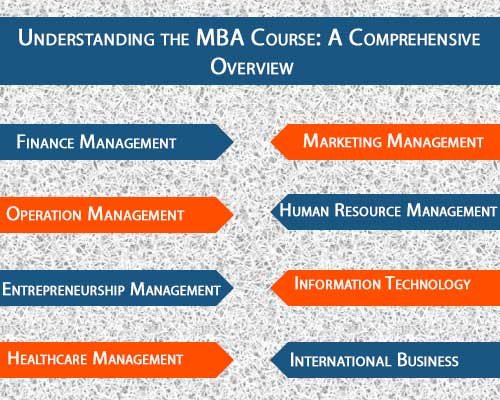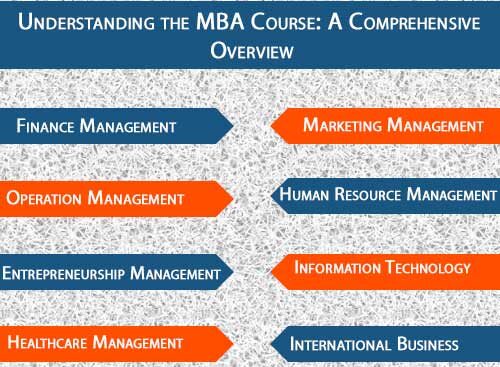Understanding the MBA Course: A Comprehensive Overview

In the first year of an MBA program, students often undergo a foundational phase, where they gain insights into core business disciplines. Courses may include financial accounting, organizational behaviour, and marketing management. This phase sets the groundwork for a deeper exploration of specialized areas in the second year.
The second year allows for elective courses, enabling students to tailor their MBA experience to match their career aspirations. Specializations can range from entrepreneurship and supply chain management to healthcare administration and information technology. Many programs also incorporate real-world experiences such as internships, case studies, and projects, fostering practical application of theoretical knowledge.
One significant aspect of MBA programs is the emphasis on developing leadership and communication skills. Teamwork is often integral, simulating the collaborative nature of the business environment. Moreover, exposure to diverse perspectives through interactions with classmates and faculty members contributes to a well-rounded education.
The MBA journey culminates in a final project or thesis, allowing students to apply their acquired knowledge to solve real-world business challenges. Upon completion, graduates are equipped to navigate the complexities of the global business landscape, take on leadership roles, and make strategic decisions that drive organizational success. The MBA thus serves as a valuable investment in one’s professional growth and opens doors to diverse career opportunities across industries.
Core Components:
- Curriculum Diversity:
The MBA curriculum is a dynamic blend of theoretical and practical knowledge. Core subjects typically cover areas such as finance, marketing, operations, human resources, and strategy. Elective courses allow students to tailor their education based on their interests and career goals.
- Real–World Application:
MBA programs emphasize the application of theoretical concepts to real-world scenarios. Case studies, simulations, and practical projects are integral components that bridge the gap between academic theory and the challenges faced in the business environment.
MBA programs often bring together a diverse group of professionals, fostering valuable networking opportunities. Interactions with peers, faculty, and industry professionals can be instrumental in building a robust professional network.
MBA Specializations: Tailoring Expertise to Your Goals
MBA programs often provide students with the opportunity to specialize in a specific area of business. Some common specializations include:
• Finance: Specializing in finance equips individuals with skills in financial analysis, investment management, and risk assessment. The benefit lies in developing a strong foundation for roles in banking, corporate finance, or financial consulting.
• Marketing: Those opting for a marketing specialization delve into consumer behaviour, market research, and strategic branding. The advantage is gaining the ability to create and implement effective marketing campaigns, fostering business growth.
• Operations Management: Specializing in operations management focuses on optimizing processes, supply chain management, and logistics. This specialization is beneficial for those aspiring to streamline business operations and enhance efficiency.
• Human Resources: An HR specialization emphasizes people management, talent acquisition, and organizational development. The benefit is acquiring skills crucial for fostering a positive work environment and effective team dynamics.
•Entrepreneurship: For aspiring entrepreneurs, an entrepreneurship specialization offers insights into start up strategies, venture capital, and innovation. This specialization is advantageous for those looking to navigate the challenges of launching and growing their own businesses.
• Information Technology Management:
It Integrates business and technology, covering topics like IT strategy, data analytics, and cybersecurity. Graduates are prepared for roles in IT leadership and technology consulting.
• Healthcare Management:
Healthcare Management Tailored for those interested in the healthcare industry, covering healthcare policy, management, and administration. Graduates can pursue roles in hospital management or healthcare consulting.
• International Business:
It explores global business strategies, cross-cultural management, and international trade. Graduates often work in multinational corporations or international trade organizations.
• Supply Chain Management:
Supply chain management focuses on the efficient flow of goods and services from production to consumption. Graduates are well-suited for roles in logistics, procurement, and supply chain optimization.
10 Advantages of Specializing in an MBA Program
•Expertise in a Niche Industry: MBA specializations allow you to dive deep into a specific industry, gaining specialized knowledge that makes you a valuable asset in that field.
• Career Acceleration: Specialized MBA programs can fast-track your career by providing targeted skills and industry-specific insights, helping you climb the corporate ladder more swiftly.
•Networking Opportunities: Specializations offer a chance to connect with like-minded professionals, professors, and industry leaders, expanding your professional network significantly.
•Increased Employability: Employers often seek candidates with specialized skills. An MBA specialization enhances your employability by making you stand out in a competitive job market.
•Leadership Development: Specialized programs focus on honing leadership skills tailored to the needs of a particular sector, preparing you to take on managerial roles with confidence.
•In–Depth Knowledge: Specializations offer a deep dive into specific subjects, ensuring you acquire comprehensive knowledge that goes beyond the general business curriculum.
•Adaptability: MBA specializations equip you with the ability to adapt to the dynamic demands of your chosen industry, staying ahead of trends and changes.
•Entrepreneurial Edge: For those considering entrepreneurship, specialized MBA knowledge can provide a strategic advantage, offering insights into industry-specific challenges and opportunities.
•Global Perspective: Many MBA programs include international components, fostering a global perspective that is crucial in today’s interconnected business world. MBA Assignment Help
•Personalized Learning Experience: Specializations allow you to tailor your education to align with your interests and career goals, providing a personalized learning journey that enhances your overall satisfaction and success in the business world.
In conclusion, an MBA is not just a degree; it’s a gateway to diverse career paths. Specializing in a particular area allows individuals to tailor their education to their unique interests and career objectives, providing a strategic edge in the competitive world of business. Whether it’s finance, marketing, operations, HR, or entrepreneurship, each specialization brings its own set of benefits, ultimately shaping professionals into well-rounded leaders ready to tackle the challenges of the business landscape. Read more at Management Assignment Help








